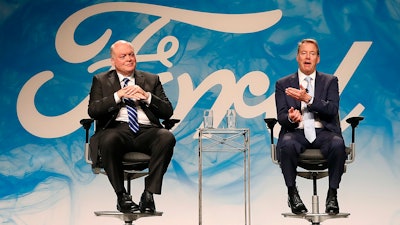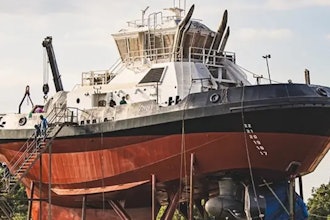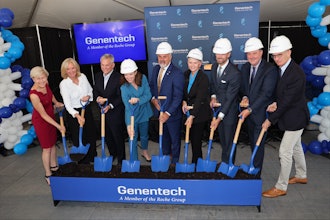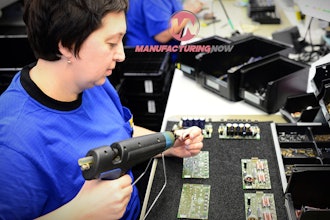
DETROIT (AP) — Earlier this week, Ford Motor Co. replaced company veteran Mark Fields as CEO with Jim Hackett, a relative newcomer to the auto industry. Ford said it needed the change to speed up decision-making and reorient toward the future.
Ford is highly profitable, thanks to strong sales of pickups and SUVs. But last year's profit of $4.6 billion was down $2.8 billion from a record in 2015. And Ford's stock price fell almost 40 percent in the three years Fields was CEO.
Hackett, 62, is credited with reviving furniture maker Steelcase. He served on Ford's board for three years and for the past year was leading Ford's mobility unit. As interim athletic director for the University of Michigan, he was responsible for luring star coach Jim Harbaugh away from professional football.
Hackett and Executive Chairman Bill Ford, the great-grandson of company founder Henry Ford, recently talked with The Associated Press about the changes. The interview is edited for length and clarity.
Q: Was the stock price slide a factor in the change of leadership?
Jim Hackett: I can't speak to that because I wasn't in the room. The way this gets fixed is the nature of the innovation and the ideas making their way into the market. It even sounds a little corny, but the stock price is a consequence of the actions that we're going to take to make the company more fit, more profitable and a more fun place to work.
Bill Ford: We've had three years under Mark's leadership of terrific earnings, which has allowed us the capital to chart any future that we choose. But these are really unparalleled times. And it really requires transformational leadership.
Q: How do you balance spending limited capital dollars on developing products for now and future products such as autonomous cars?
Bill Ford: We have to re-energize the business, including sharpening our execution in some areas. We need to modernize with all the new technology coming at us, I don't mean just product technology, but technology that is going to drive how we do business. We also have to continue to develop and also invent new business models. We need to accelerate the speed of our decision-making, and also in terms of capital allocation, we need to be very crisp and have speed of decision-making as well.
Q: You were late to the market on subcompact SUVs and small pickup trucks. How do you prevent missing market changes?
Bill Ford: Whenever we look back we can always pick winners and losers and things we did well and things we didn't do well. I think if you look at what Jim brings to the job. He reimagined Steelcase from a company that just made furniture to a company that redefined how the workspace became. It became the No. 1 manufacturer of furniture in the world. He brought the whole organization along in a way that they not only understood but they embraced. Along with what he did at University of Michigan shows that he can operate in very different kinds of situations.
Q: Ford has had some quality problems and hasn't performed well recently in outside surveys by Consumer Reports and J.D. Power. What can be done about that?
Jim Hackett: I think at the highest level, the compass for being great is human centered. If you look back at my history transforming Steelcase design thinking, it's understanding that you can make things even better. I believe we can conquer all of those. Some of the things in Consumer Reports were the interface (between drivers and the cars). Technology needs to be received in a way that people aren't bothered by it but are delighted by it.





















